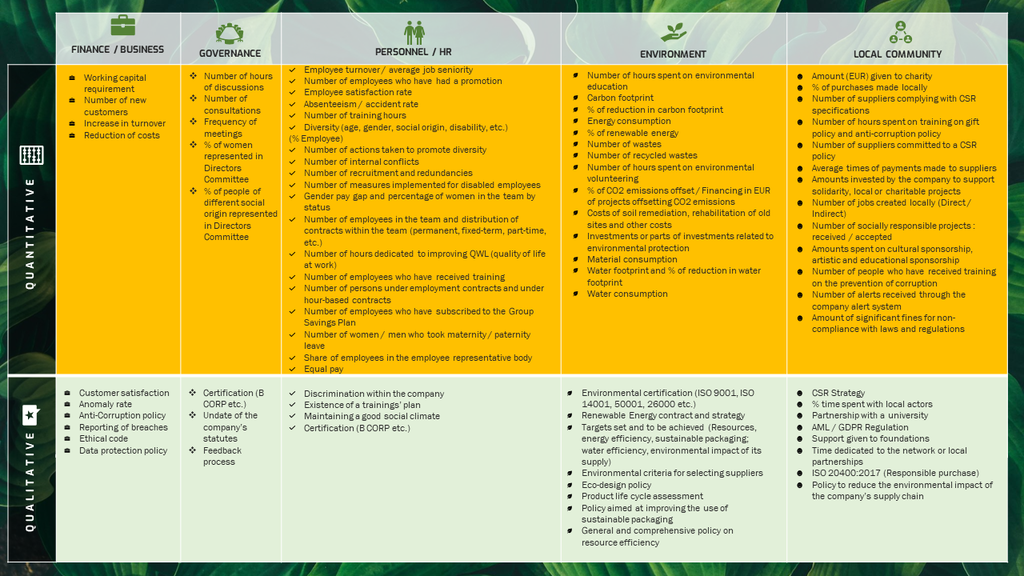CSR
CSR: An underestimated department
Five years ago a corporate’s CSR department grappled with decreasing transport emissions and to switching to renewable energy. Today, having endured the harshest impacts of the pandemic and the Ukrainian war, one questions how to implement and measure a CSR strategy to engage and retain employees? Laurent Le Lepajolec Partner & member of the Board, EXCO A2A, Kreston, Poland comments on the implementation of an efficient CSR policy.

CSR: what is it?
For a company, social responsibility has been formalised by the European Union with the following definition: “the responsibility of companies for the effects they have on society”.
To go even further, the ISO (International Organisation for Standardisation) has structured a company's responsibility towards its environment by the notion of CSR. It’s defined as "the responsibility of an organisation for the impacts of its decisions and activities on society and the environment, resulting in ethical and transparent behaviour that contributes to sustainable development, including the health and well-being of society”. CSR takes into account the expectations of stakeholders. It complies with applicable laws. It is consistent with international standards of behaviour. It is integrated throughout the organisation and is implemented in its relationships.
How to implement a CSR strategy?
The essentials of a CSR approach:
- Getting support and sharing experience.
- Appointing a project manager.
- Conducting an audit.
- Define a strategy and an action plan.
- Evaluate the necessary budget.
- Implement the necessary action plan.
- Measuring ROI.
86% of companies make their teams aware of environmental issues, but 6 out of 10 companies have not put anything in place to fight against discrimination. 89% of companies have a COMEX that drives or supports CSR however 1 in 3 companies still do not have a budget dedicated to the subject. 84% of companies carry out awareness-raising actions but in 59% of companies, very few employees are involved in the CSR process.
Within the framework of CSR, "responsible purchasing" is the number one environmental issue for companies.
Why CSR must be a critical and central department for a firm
CSR departments today are undersized. The open source CSR Barometer 2021 states that many CSR teams are still composed of 1 to 2 people. CSR teams are often attached to the General Management (26%) and are only autonomous in a third of the companies surveyed.
CSR is a strategic pillar for companies, yet it is often understaffed and under-budgeted.
When it came to CSR, the top three obstacles companies faced in 2022 were a lack of time being devoted to the discipline (82%), the difficulty in measuring impact (70%), and the lack of team (65%).
Implementing a CSR policy has many advantages for companies: Better risk management; improved employer brand and ability to attract talent; motivated teams; a greater sense of purpose; reduced costs; and being better prepared for regulatory changes. In addition the company will benefit from an improved reputation and image, helping them to meet the expectations of customers, differentiate from competitors, win in new markets and attract investors. According to “France Stratégie”, companies that have integrated ESG criteria have increased their performance by an average of 13%. CSR is therefore not a constraint but an investment that contributes to the company's sustainability.
According to a Harvard Business School blog post, 90% of employees who work for organisations with a strong and meaningful purpose (which is often reflected in CSR efforts), say they’re more motivated, inspired, and loyal. But how do you engage employees in CSR?
Engage your employees
One of the prerequisites for having a functioning CSR department in the company is to remember to engage your employees. Here are a few guidelines we’ve used to help employees understand CSR policies and objectives:
- Align your organisational values with your employees’ values.
- Be transparent about goals and educate your employees.
- Adapt your CSR policies to the concerns of your teams.
- Give your leaders a voice and promote them.
- Encourage and celebrate employees.
- Create an experience for the team.
- Incentivise participation in CSR initiatives.
Companies must be proactive in engaging their employees by aligning values with theirs, promoting initiatives, and offering fun incentives. But how can you ensure your actions are efficient?
What KPIs should be used for CSR activities?
While financial indicators have established themselves as recognised standards in a company's balance sheet, this is far from being the case for CSR indicators.
CSR is not an intangible asset. The difficulty for companies lies in measuring performance in terms of the creation of non-accountable value over the long term. CSR expenditure should not be seen as a charity cost but as an immediate expense to mitigate future costs resulting from employee turnover, business development, employer branding, etc, thereby making it a strategic investment for the medium or long-term.
KPI action points:

Laurent Le Lepajolec Partner & member of the Board, EXCO A2A, Kreston, Poland